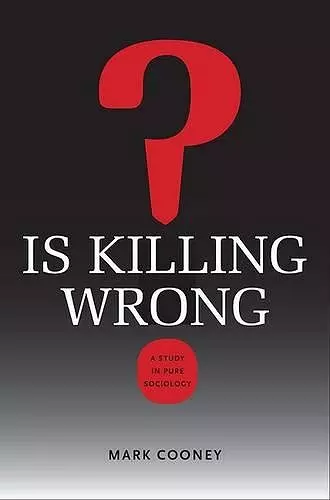Is Killing Wrong?
A Study in Pure Sociology
Format:Hardback
Publisher:University of Virginia Press
Published:30th Oct '09
Should be back in stock very soon

'Thou shalt not kill' is arguably the most basic moral and legal principle in any society. Yet while some killers are pilloried and punished, others are absolved and acquitted, and still others are lauded and lionized. Why? The traditional answer is that how killers are treated depends on the nature of their killing, whether it was aggressive or defensive, intentional or accidental. But those factors cannot explain the enormous variation in legal officials' and citizens' responses to real-life homicides. Cooney argues that a radically new style of thought - pure sociology - can. Conceived by the sociologist Donald Black, pure sociology makes no reference to psychology, to any single person's intent, or even to individuals, as such. Instead, pure sociology explains behavior in terms of its social geometry - its location and direction in a multidimensional social space. "Is Killing Wrong?" provides the most comprehensive assessment of pure sociology yet attempted. Drawing on data from well over one hundred societies, including the modern-day United States, it represents the most thorough account yet of case-level social control, or the response to conduct defined as wrong. In doing so, it demonstrates that the law and morality of homicide are neither universal nor relative but geometrical, as predicted by Black's theory.
"Mark Cooney's Is Killing Wrong? is a masterful application of pure sociology to the social response to homicide. Drawing on voluminous historical, cross-cultural, and current social science evidence, Cooney shows that the response to homicide, ranging from praise to the death penalty, is tied to the social statuses and relationships of victims, perpetrators, and third parties. This book should be required reading for legal scholars, criminologists, and sociologists who study homicide and its control, and anyone who doubts that morality is a product of social structure." - Richard Rosenfeld, University of Missouri, St. Louis, coauthor of Crime and the American Dream"
ISBN: 9780813928265
Dimensions: unknown
Weight: unknown
256 pages